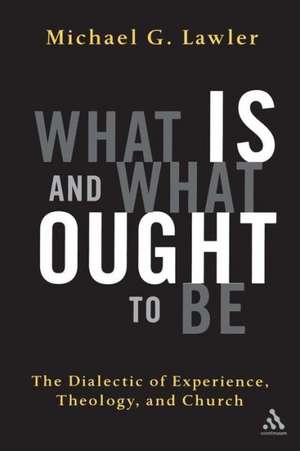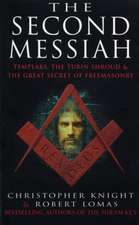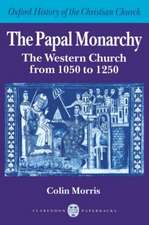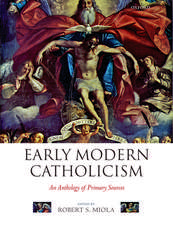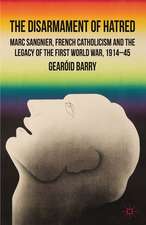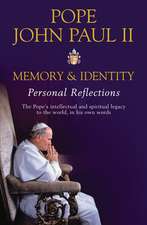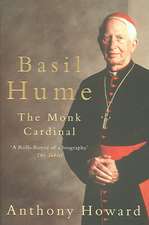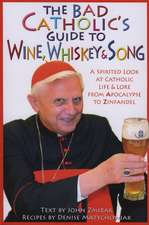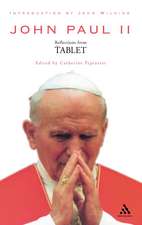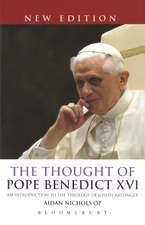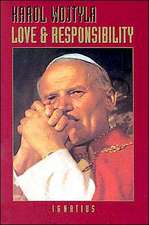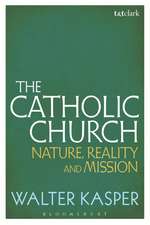What Is and What Ought to Be: The Dialectic of Experience, Theology, and Church
Autor Michael G. Lawleren Limba Engleză Paperback – 31 mai 2005
Preț: 256.77 lei
Preț vechi: 295.02 lei
-13% Nou
Puncte Express: 385
Preț estimativ în valută:
49.13€ • 51.30$ • 40.66£
49.13€ • 51.30$ • 40.66£
Carte tipărită la comandă
Livrare economică 05-19 aprilie
Preluare comenzi: 021 569.72.76
Specificații
ISBN-13: 9780826417046
ISBN-10: 0826417043
Pagini: 224
Dimensiuni: 153 x 229 x 16 mm
Greutate: 0.33 kg
Ediția:New.
Editura: Bloomsbury Publishing
Colecția Continuum
Locul publicării:New York, United States
ISBN-10: 0826417043
Pagini: 224
Dimensiuni: 153 x 229 x 16 mm
Greutate: 0.33 kg
Ediția:New.
Editura: Bloomsbury Publishing
Colecția Continuum
Locul publicării:New York, United States
Cuprins
Contents1.Theology, Sociology, and Theologians2.Theology and Sociology: Mutual Mediations3.Sociology of Knowledge and Theology4.Theology, Sociology, and Scripture5.The Church Emerging in the Human Community6.Reception and Sensus Fidei7.Sociology, Divorce and Remarriage, Contraception
Recenzii
"Michael Lawler has written a challenging invitation to theologians to incorporate social science in the construction of theological categories, and he has gone a good way in helping us to see how this is done. The book is particularly useful for the field of practical theology or (in Lonergan's terms) communications, but its relevance extends to the other tasks of direct discourse in theology as well. May we accept the challenge!"
"In masterful fashion Michael Lawler describes how knowledge drawn from experience and developed critically and interactively by sociologists and theologians can provide fuller and more accurate insight into Christian faith and participation in the institutionalized church. This is a significant contribution to the study of theological method, one that draws and enriches the heritage of both Congar and Lonergan."
"Michael Lawler has written a sprawling, ambitious book that comes in under 200 pages, a feat for which he should be praised, and an example which ought to be followed by other scholars...Because the issues he raises are so vital to almost any theologian working today, the book should be required reading...this is a very, very important book, which raises a real issue. This text, along with Terry Tilley's Inventing Catholic Tradition, begin to outline a trajectory forward for those of us younger Catholics who find ourselves desiring more tradition than some post-Vatican II theology gives, and yet who find the idea of unchanging and authoritarian tradition completely in-credible in today's church and world." -Catholic Books Review, 2005
"[Lawler's] book deserves to be read on its own for his contribution to enriching theology, especially in the line of Lonergan's reflection." -Leo Laberge, Recensions, Vol. 40, 2009
"In masterful fashion Michael Lawler describes how knowledge drawn from experience and developed critically and interactively by sociologists and theologians can provide fuller and more accurate insight into Christian faith and participation in the institutionalized church. This is a significant contribution to the study of theological method, one that draws and enriches the heritage of both Congar and Lonergan."
"Michael Lawler has written a sprawling, ambitious book that comes in under 200 pages, a feat for which he should be praised, and an example which ought to be followed by other scholars...Because the issues he raises are so vital to almost any theologian working today, the book should be required reading...this is a very, very important book, which raises a real issue. This text, along with Terry Tilley's Inventing Catholic Tradition, begin to outline a trajectory forward for those of us younger Catholics who find ourselves desiring more tradition than some post-Vatican II theology gives, and yet who find the idea of unchanging and authoritarian tradition completely in-credible in today's church and world." -Catholic Books Review, 2005
"[Lawler's] book deserves to be read on its own for his contribution to enriching theology, especially in the line of Lonergan's reflection." -Leo Laberge, Recensions, Vol. 40, 2009
